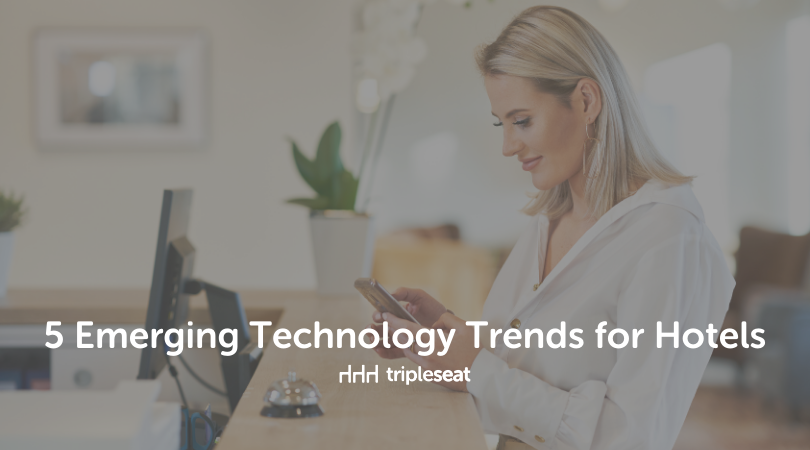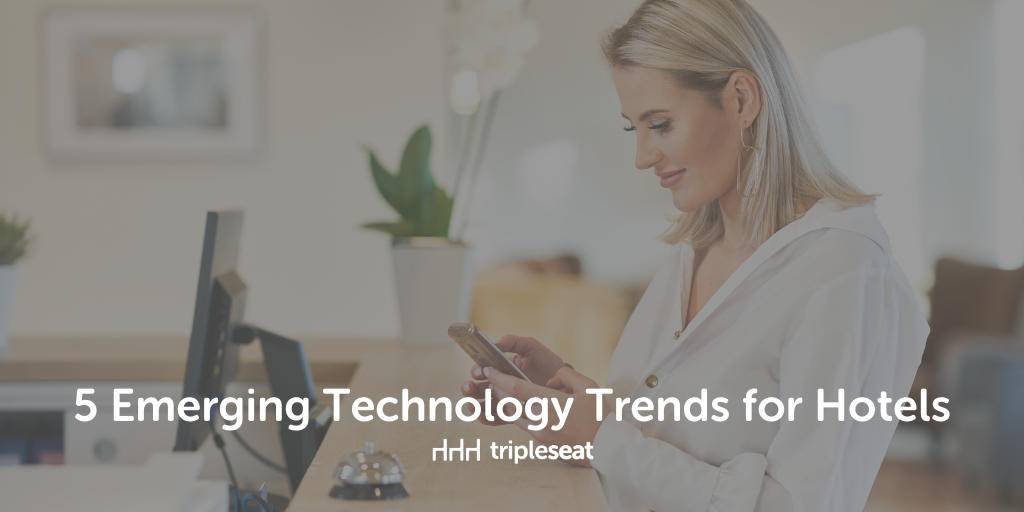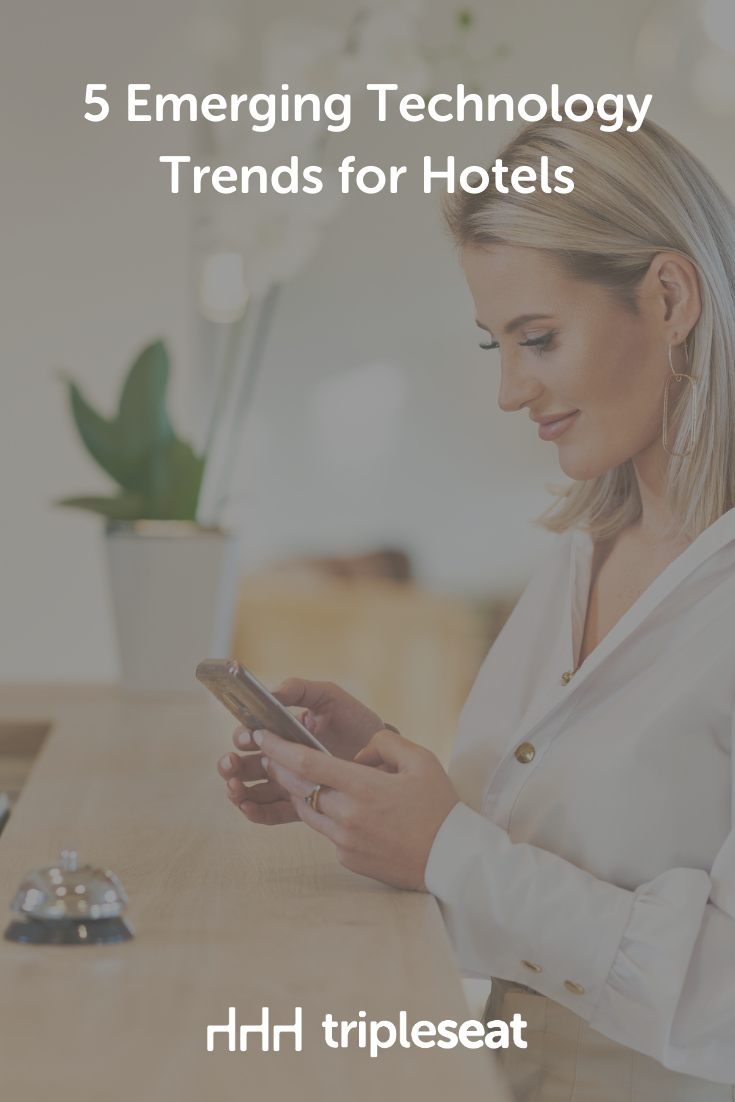5 Emerging Technology Trends for Hotels

In a world that’s changing due to the COVID-19 pandemic, hoteliers are looking to stay ahead of the emerging technology trends to stay compliant with health and safety regulations and build trust with their hotel guests.
Here are five trends that hotels should consider implementing to drive business in 2020 and beyond.
1. Contactless payment, room entry, and mobile check-in
Contactless payment and mobile check-in were being adopted in some hotels around the world before the COVID-19 pandemic, but now with the new normal, it’s becoming an industry standard as we look to the future of travel. A great example of how this has been used successfully is with Hilton. They’re using their Hilton Honors Loyalty Program as a contactless, seamless way for guests to pay and check in.
The brands that are under the Hospitality Ventures Management Group are now branching further, and developing a program for non-loyalty members to take advantage of keyless entry and contactless payments. While business travel is minimal, hoteliers are using this time to update their common space and rooms with the contactless technology that HVMG has already started to use. Guests can take advantage of contactless check-in and checkout, digital menus, pre-plated breakfast, and contactless experiences through mobile apps, as well as access to their in-room TV, guest service, room service, and more.
It’s said that the future of hotels is all about building trust; implementing these practices and new contactless technology will certainly go a long way with building that trust.
2. Hotel robots and chatbots
If you listened to a recent episode of Tripleseat’s podcast, Two Chicks Three Seats, you may remember our hosts talking about Marty, the Stop & Shop robot, who slides around the grocery store’s locations to be available to customers who need a price check, or to notify the team of a mess. Well, hotels are now looking at robots for more than just cleaning.
Hotels, such as the Westin Houston Medical Center Hotel in Texas, have added virus-zapping robots, which have helped to keep their spaces cleaner. These robots have not replaced their cleaning team; they’re an addition to it, going into each room after cleaning is complete to give it an additional blast to kill any virus. In addition, you’ll find that hotels are using robots to help with room service delivery and cleaning of common areas.
Robots have been in the hotel world within the last few years, but since COVID, their usage has almost tripled. Some fear that robots will eventually replace human workers, but hoteliers are assuring that they will only be an addition, helping with current operations instead of replacing.
3. Hotel virtual reality tours
Prior to the COVID-19 pandemic, most hotels and event venues would have photos of their space online or readily available to help showcase their space to potential corporate group bookings. 3D tours have been around since the early 1990s, but they were few and far between when searching for event space. Now, 3D tours and virtual reality tours are becoming a way of life for a lot of sales and event managers.
In addition, having these tours on your website is said to increase the time visitors spend on your website by 5 or 6 times. Giving guests from around the world a chance to step into your venue from the comfort of their home, especially during the COVID-19 pandemic has been a game-changer in the events world.
Going a step beyond 3D tours are virtual reality tours. A recent post by AcommNews mentions a virtual reality tour by The Peninsula Paris that stands out because it’s mixed with interactive videos and gives their website visitors the feeling of being within their hotel and space. During a time when site visits are hard to schedule, these style online tours are amazing and can be presented via Zoom or over a conference call (a sales or event manager’s dream).
4. Smart hotels
The recent emergence of smart hotels and smart rooms are having a lot of people talking. Imagine using your phone to check in, enter your room, and request items from room service or housekeeping. Or how about walking into your room and having the lights turn on automatically, and using voice control to operate the TV and temperature controls of your room. All of these things are becoming a new normal in a lot of hotels around the world, and it’s making a lot of travelers excited.
With smart rooms comes better sustainability. New technologies can make a room’s lighting automatically dim or get brighter, given the amount of light in the room (daylight vs. diminishing light in the evening). What’s even cooler (or creepier, depending on how you feel about this), is that Amazon just launched Amazon for Hospitality, which gives guests the option of hooking up their own Alexa accounts to an Amazon Echo in the room via an app, allowing for them to choose their own entertainment.
5. Cloud-based technology
In previous years, even as technology became smarter, hoteliers didn’t think to update their legacy systems because they had financial success and there wasn’t a need to change. The software they used was on-site, and so was their team. And then 2020 happened, which quickly impacted the hospitality industry. Some hospitality companies learned to pivot quickly to drive business. A lot of hoteliers took this as an opportunity to update their legacy systems to a cloud-based, all-in-one system.
Switching to an all-in-one, cloud-based system like Tripleseat allows for automation, consistency, and more productivity. And, most importantly, you can access your information from any device, anywhere. If 2020 helped us with anything, it was giving us the time to slow down for a minute and really audit the systems that are in place within our hotels. Having systems in place that allow for scalability is always a positive thing.
Get the right technology in place to grow your revenue
The number of smart technologies that are emerging is endless and hotels are integrating what they can little by little — allowing for a more clean, safe, and sustainable stay for their guests. Having a plan in place to identify where you can slowly begin to move the needle is an important start, and ensuring that you’re communicating with your guests so you’re building trust is what will help hotels and hospitality venues come out of this on the other side stronger, smarter and more successful.
Schedule a demo to learn more about Tripleseat. Our event management features can help you increase and manage the group sales that are essential for filling hotel guest rooms, booking event function spaces, growing banquet revenues, and increasing your overall revenue.



